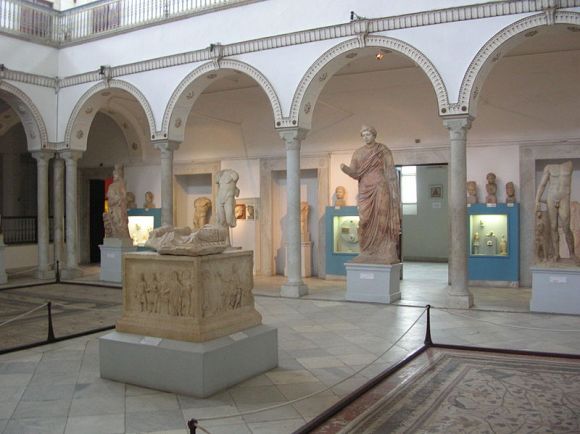
On March 18, three terrorists attacked and took hostage patrons at the Bardo National Museum in Tunisia, killing 21 people and injuring about 50 others. Among those injured was Noriko Yuki, a Japanese tourist visiting Tunisia with her mother.
Ms. Yuki sustained a gunshot wound in the attack and was taken to a nearby hospital for treatment. There, shortly after her surgery, she was immediately bombarded by Japanese media looking to interview her, with some members of the press apparently going so far as to tell the Japanese ambassador watching over her that he did “not have the authority to stop us from interviewing her.”
Noriko Yuki (age 35), a major in the Japanese Self Defense Forces, was taken to the Charles Nicolle Hospital in the Tunisian capital shortly after the attacks on March 18. The very next day, reporters from Japan’s Asahi Shimbun arrived at the hospital and asked the doctors if Ms. Yuki was well enough to be interviewed. They were told she only had minor wounds remaining after the surgery and so permitted them to talk to her.
Security lead them all the way to Noriko’s room, but before they entered, the Japanese ambassador who had spent the past several days with Ms Yuki and knew that she was in no state to do an interview told them they could not enter. The reporters told him: “If you were Noriko herself or her family then you could stop us interviewing her, but you do not have the authority to stop us from interviewing her.”
But stop them he did. The reporters left a little while after, never getting that interview with the barely-conscious Noriko, who gave a statement a few days later on March 20. Here is the translation:
(She goes into detail on her trip and the attack itself, so scroll down to “The interview” if you’re just interested in that.)
“I’m sorry for troubling everyone, and I want to apologize for causing any inconvenience. I also want to thank everyone too, since I’ve been unable to get any information about the terrorist attack or the aftermath. Even though I was caught up in it, I know almost nothing about it, and everyone has been so kind in informing me. Since I’m in no condition to appear in public, I’d like to express my gratitude through writing.
My mother and I left Japan on March 14, and we arrived in Italy on the 15. From there we took a cruise to Tunisia and joined a tour group. Our guide spoke English and French, so I didn’t understand a lot of what they were saying.
We arrived at the museum at 11:30, and when we were looking around on the 2nd floor, a member of our group said ‘there’s someone holding a gun outside the window.’ Our tour guide was very casual about it and said ‘that’s something that you see quite often in Tunisia.’ Shortly after, we heard gunfire and everyone, myself included, started running. I saw people bleeding and falling to the ground around me. I slammed into somebody, fell down, and then heard a gunshot and felt pain in my ear. When I looked back to the entrance to the room, there was a man holding a gun. I couldn’t see his face. I covered my head with my hands and stayed lying down. The guns kept going off for quite a while. I hurt all over and thought I was going to die, I couldn’t believe something like this was actually happening.
After a while the man left, and when I stood up there were about ten people on the ground around me. Some were unharmed, some weren’t moving.
I was bleeding from my left hand, left ear, and neck, but other than that I was fine. My mom was on the ground next to me. Blood was coming out of her neck; there was a pool of it underneath her head. When I called to her she said ‘my neck hurts’ and moved around a bit, so I was relieved that she was alive, but she couldn’t move by herself. I kept hearing gunfire and worried that the gunmen would come back. Making everything even worse was the thought that I was the one who had invited my mother to come on this trip, so it was my fault this happened to her.
Policemen then came to help us and I was so happy I cried. I asked them to help my mother, but they said that people who could walk would be taken first, so I was put in an ambulance and separated from her.
When I arrived at the hospital, the bag that had my passport was taken away, as well as my cellphone. After my examination and treatment, I was told I would need to be put to sleep for surgery, so I was again loaded into an ambulance and taken to another hospital. The whole time, inside and outside the hospital, lots of people were taking pictures and video of me which made me feel very uncomfortable.
At the new hospital I was given medicine for the pain, and shortly after a large group of people came into my room: the Tunisian Prime Minister, government officials, and others. I told them all to please find my mom. NHK and New York Times reporters also came in and asked me questions. I thought I had no choice, and I was out of it that honestly I have no memory of anything I told them.
The Japanese Ambassador also came, asking for my contacts in Japan to call. Since I didn’t have my cellphone and could only remember my parents’ landline number, we didn’t get through to anyone.
That evening I learned that my mom was in another hospital and had had surgery and was doing fine. I was relieved, but I was told I would need surgery too. They put me to sleep, and when I woke up it was over, but the pain was far worse than before, so I asked for some medication. But that just made me worry: my mom didn’t know any English. What would she do if she couldn’t communicate? What if she was in pain too?”
The interview
“When I was brought back to my room, the Japanese Ambassador and local Japanese coordinator were there. Since I’d been crying all day my eyes were inflamed and I couldn’t open them, so I couldn’t see their faces. The ambassador called my mother for me, and I was relieved to hear her voice. The coordinator called Nippon Television and asked me to do an interview with them over the phone. I did as I was asked and answered the questions. At the end they asked me if they could show the interview on TV, and since I was embarrassed at the horrible state I was in I said no. They then told me that my my name, face, and interview with NHK had already been broadcast, so it didn’t really make a difference. That was the first time I’d heard anything about that, so I was shocked.
The next day I got my bag and passport back and was able to talk to family back home. My mother was moved to the same hospital as me and then into the same room as well.
After she was moved, I heard someone yelling at the Japanese Ambassador outside the room: ‘Let us do the interview. You do not have the authority to stop us from interviewing her.’ The ambassador told me: ‘Asahi Shimbun wants you to let them interview you, but you don’t have to do it. You’re in bad shape, and we don’t know how the interview will be used, so you can refuse if you’d like.’ Since I’d been doing all these interviews up to now thinking I had no choice, I was so happy I cried.
Yesterday I was asked to do an interview with Fuji Television. I thought about refusing again, but I wanted to tell everyone what happened, and how I feel. So instead of refusing I decided to give my statement through writing instead. My mother is getting surgery again, and then depending on how that goes we might be able to go back to Japan. Both of us are fine, but we’re in bad shape, and we want to go back home as soon as possible. We’re very thankful to everyone in Tunisia who helped us, and to the Japanese Ambassador and everyone else. Now we just ask that you please let us rest for a while. Thank you.”
Asahi Shimbun has since released a response, apologizing for demanding an interview:
“The reporter should not have shouted at the ambassador. We have read Ms. Yuki’s statement, and we apologize to her.”
Noriko Yuki, her mother, and everyone else involved in this horrible incident has been through a terrible ordeal. After being through a terrorist attack, they shouldn’t have to worry about attacks from their home country’s media. Let’s hope that everyone who was hurt in this crime gets the treatment they need, all the while avoiding intrusive interviews from pushy reporters.
Source: Sankei News via Itai News
Featured/top image: Wikimedia Commons

 Japanese police to use AI to search social media posts for potential terrorists
Japanese police to use AI to search social media posts for potential terrorists Welsh rugby team wins over the heart of Japanese mom, receives sweet handwritten note from her
Welsh rugby team wins over the heart of Japanese mom, receives sweet handwritten note from her Japanese mom’s don’t-touch-my-baby-stroller sign stirs up debate【Video】
Japanese mom’s don’t-touch-my-baby-stroller sign stirs up debate【Video】 This Japanese cafe for stuffed animals is a sweet day out for nuikatsu fans
This Japanese cafe for stuffed animals is a sweet day out for nuikatsu fans Diving into the 2024 JC & JK Buzzword Award nominations for trendy Japanese slang and more
Diving into the 2024 JC & JK Buzzword Award nominations for trendy Japanese slang and more Eevee returns to Japan’s famous Tokyo Banana, bundled with a cute tote bag
Eevee returns to Japan’s famous Tokyo Banana, bundled with a cute tote bag Potama serves up epic rice balls like no other, and there’s only one store in Tokyo
Potama serves up epic rice balls like no other, and there’s only one store in Tokyo Does this video about an abandoned dog leave you wiping your eyes or shaking your fist?
Does this video about an abandoned dog leave you wiping your eyes or shaking your fist? Japanese city paints well-known prostitution street bright yellow, adds fish art【Video】
Japanese city paints well-known prostitution street bright yellow, adds fish art【Video】 American tourist arrested in Japan on charges of pushing sexual services worker down stairs
American tourist arrested in Japan on charges of pushing sexual services worker down stairs Can you eat lunch in Tokyo for less than 500 yen?
Can you eat lunch in Tokyo for less than 500 yen? Saitama is home to the best strawberries in Japan that you’ve probably never even heard of
Saitama is home to the best strawberries in Japan that you’ve probably never even heard of Sanrio changes Hello Kitty lead designer for first time in 46 years
Sanrio changes Hello Kitty lead designer for first time in 46 years Beautiful Japanese race queen goes from trackside to driver’s seat as she becomes pro drifter
Beautiful Japanese race queen goes from trackside to driver’s seat as she becomes pro drifter Top five Japanese prefectures for childhood education expenditure would make any wallet shudder
Top five Japanese prefectures for childhood education expenditure would make any wallet shudder Starbucks Japan releases first-ever Hinamatsuri Girls’ Day Frappuccino
Starbucks Japan releases first-ever Hinamatsuri Girls’ Day Frappuccino Japanese restaurant chain serves Dragon Ball donuts and Senzu Beans this spring
Japanese restaurant chain serves Dragon Ball donuts and Senzu Beans this spring Highest Starbucks in Japan set to open this spring in the Tokyo sky
Highest Starbucks in Japan set to open this spring in the Tokyo sky Tokyo Skytree turns pink for the cherry blossom season
Tokyo Skytree turns pink for the cherry blossom season Japan Extreme Budget Travel! A trip from Tokyo to Izumo for just 30,000 yen [Part 1]
Japan Extreme Budget Travel! A trip from Tokyo to Izumo for just 30,000 yen [Part 1] Yakuzen ramen restaurant in Tokyo is very different to a yakuza ramen restaurant
Yakuzen ramen restaurant in Tokyo is very different to a yakuza ramen restaurant Japan has only one airport named after a samurai, so let’s check out Kochi Ryoma【Photos】
Japan has only one airport named after a samurai, so let’s check out Kochi Ryoma【Photos】 Japanese drugstore sells onigiri at pre-stupid era prices, but how do they compare to 7-Eleven?
Japanese drugstore sells onigiri at pre-stupid era prices, but how do they compare to 7-Eleven? Japan Extreme Budget Travel! A trip from Tokyo to Izumo for just 30,000 yen [Part 2]
Japan Extreme Budget Travel! A trip from Tokyo to Izumo for just 30,000 yen [Part 2] Adorable Totoro acorn key holders come with a special guest hidden inside[Photos]
Adorable Totoro acorn key holders come with a special guest hidden inside[Photos] Japan’s newest Shinkansen has no seats…or passengers [Video]
Japan’s newest Shinkansen has no seats…or passengers [Video] Starbucks Japan releases new sakura goods and drinkware for cherry blossom season 2026
Starbucks Japan releases new sakura goods and drinkware for cherry blossom season 2026 Foreigners accounting for over 80 percent of off-course skiers needing rescue in Japan’s Hokkaido
Foreigners accounting for over 80 percent of off-course skiers needing rescue in Japan’s Hokkaido Super-salty pizza sends six kids to the hospital in Japan, linguistics blamed
Super-salty pizza sends six kids to the hospital in Japan, linguistics blamed Starbucks Japan unveils new sakura Frappuccino for cherry blossom season 2026
Starbucks Japan unveils new sakura Frappuccino for cherry blossom season 2026 Foreign tourists in Japan will get free Shinkansen tickets to promote regional tourism
Foreign tourists in Japan will get free Shinkansen tickets to promote regional tourism The 10 most annoying things foreign tourists do on Japanese trains, according to locals
The 10 most annoying things foreign tourists do on Japanese trains, according to locals Take a trip to Japan’s Dododo Land, the most irritating place on Earth
Take a trip to Japan’s Dododo Land, the most irritating place on Earth Naruto and Converse team up for new line of shinobi sneakers[Photos]
Naruto and Converse team up for new line of shinobi sneakers[Photos] Is China’s don’t-go-to-Japan warning affecting the lines at a popular Tokyo gyukatsu restaurant?
Is China’s don’t-go-to-Japan warning affecting the lines at a popular Tokyo gyukatsu restaurant? Survey asks foreign tourists what bothered them in Japan, more than half gave same answer
Survey asks foreign tourists what bothered them in Japan, more than half gave same answer Japan’s human washing machines will go on sale to general public, demos to be held in Tokyo
Japan’s human washing machines will go on sale to general public, demos to be held in Tokyo Starbucks Japan releases new drinkware and goods for Valentine’s Day
Starbucks Japan releases new drinkware and goods for Valentine’s Day We deeply regret going into this tunnel on our walk in the mountains of Japan
We deeply regret going into this tunnel on our walk in the mountains of Japan Studio Ghibli releases Kodama forest spirits from Princess Mononoke to light up your home
Studio Ghibli releases Kodama forest spirits from Princess Mononoke to light up your home Major Japanese hotel chain says reservations via overseas booking sites may not be valid
Major Japanese hotel chain says reservations via overseas booking sites may not be valid Put sesame oil in your coffee? Japanese maker says it’s the best way to start your day【Taste test】
Put sesame oil in your coffee? Japanese maker says it’s the best way to start your day【Taste test】 No more using real katana for tourism activities, Japan’s National Police Agency says
No more using real katana for tourism activities, Japan’s National Police Agency says